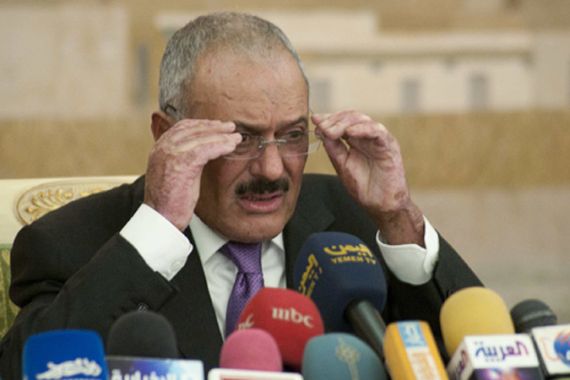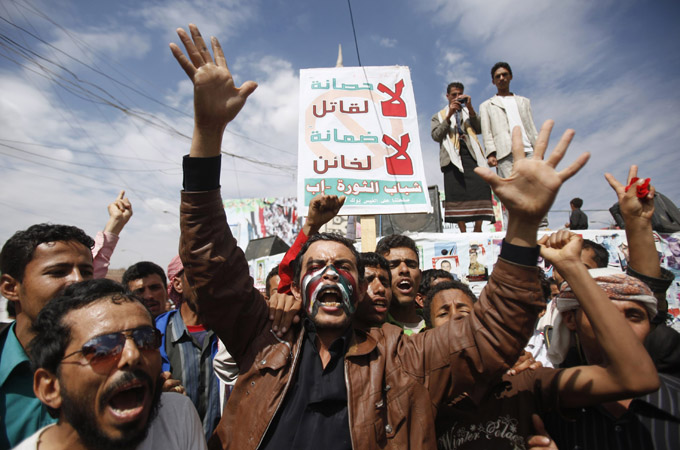UN official says Yemen amnesty may be illegal
Commissioner for human rights says amnesty for president cannot apply where international crimes may have taken place.

 |
| A GCC deal offered an amnesty to Saleh after Yemenis had protested around the country for months [Reuters] |
Granting amnesty to perpetrators of war crimes and human rights abuses under Yemen’s presidential transition deal would be against international law, the UN human rights chief has said.
“I have been closely following the events in Yemen, particularly the very contentious debate about an amnesty law to be presented to Parliament shortly,” UN High Commissioner for Human Rights Navi Pillay said on Friday.
“International law and the UN policy are clear on the matter: amnesties are not permissible if they prevent the prosecution of individuals who may be criminally responsible for international crimes including war crimes, crimes against humanity, genocide, and gross violations of human rights.”
A Gulf Co-operation Council (GCC) initiative, signed by President Ali Abdullah Saleh in November after months of mass anti-government protests, forced the president to hand power to Abdrabuh Mansur Hadi, the vice president.
Hadi, meanwhile, has told international and GCC mediators that he may leave the capital if Saleh continues to interfere in his job.
Pillay has previously blamed government forces for using live ammunition against unarmed protesters and has said Saleh should not have been granted an amnesty to leave power.
Rupert Colville, a spokesperson for Pillay in Geneva, declined to elaborate further or say who might face which charges.
A source in the cabinet, which discussed the draft law this week, has said in its present form the amnesty deal would grant immunity widely to Saleh’s aides and allies.
“Based on information we have gathered, there is reason to believe that some of these crimes were committed in Yemen during the period for which an amnesty is under consideration,” Pillay said.
“Such an amnesty would be in violation of Yemen’s international human rights obligations.”
She also said any legislation must not discriminate between individuals who are pro-government or in opposition.
‘Counterterrorism’ strategy
Until November, Saleh had repeatedly refused to accept deals brokered to encourage him to leave power after 33 years.
As well as facing protests since January of last year that have pushed Yemen to the brink of civil war, his forces have been battling fighters who have seized several towns.
The government says the fighters are linked to al-Qaeda’s Yemen-based regional wing, which the US has called the most dangerous branch of the network.
Saleh’s opponent accuse him of ceding territory to the fighters to bolster his assertion that his rule keeps al-Qaeda in check.
Washington and oil giant Saudi Arabia fear uncertainty over Saleh’s fate may push the country further into chaos and help al-Qaeda.
Saudi Arabia has supported Saleh by donating diesel and crude oil, and the US, which long backed Saleh as a pillar of its “counterterrorism” strategy, helped craft the power transition deal giving him immunity from prosecution.